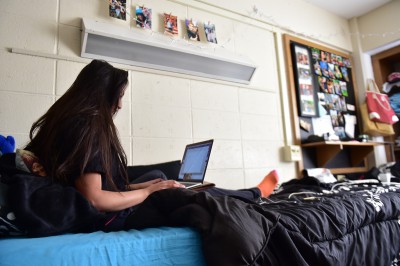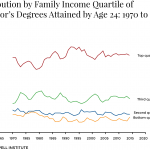
Approximately 2,300 Boston University students took advantage of the available on-campus dormitories over spring break last week, said BU Housing Director Nishmin Kashyap. This was the second time all on-campus residences remained open this school year, following Thanksgiving break in the fall 2015 semester.
Kashyap announced Feb. 12, 2015 in an email to the BU community that all dormitory-style residences would remain open during Thanksgiving and spring break beginning with the 2015-16 academic year. Approximately 3,000 students remained living on campus during Thanksgiving break for the first time, The Daily Free Press reported Dec. 3, 2015.
“Out of 11,500 [students] who live on campus, [last week] … about 20 percent of the population was here, on average,” Kashyap said. “… So students did take advantage of staying here.”
Kashyap said opening the dormitories during breaks “made good sense,” considering the demographics of BU students.
“We have a large international student population, we have students coming from across the nation,” Kashyap said. “During all breaks, all apartment-style residences are always open. So [10 Buick St.] and [33 Harry Agganis Way], the brownstones, etc. have all historically been open.”
Students who lived on campus during Thanksgiving and spring break used to be placed in hotels for vacation housing at a reduced rate, Kashyap explained. The housing policy change, however, did not affect the winter intersession, as dormitories remained closed during that time and students still had to sign up for vacation housing, Kashyap added.
Students who lived on campus during the break last week were provided with extended hours in the Union Court at the George Sherman Union for dining services. Several additional stations were opened and had extended service until 7 p.m., BU’s Director of Dining Services Barb Laverdiere wrote in an email.
“We expected the guest counts to be low, and given that this week is not covered by the meal plan, it made sense to open [the] GSU for extended service,” Laverdiere noted. “The central location on campus and the ability to serve any faculty and staff working during this week also made [the] GSU the logical choice.”
Basho Express, Raising Cane’s and all City Convenience stores were also open during the break, Laverdiere added.
An average of approximately 1,150 daily transactions were made at the Union Court during the break, Laverdiere noted. This translates to a doubled average compared to last spring break’s 495 daily transactions, while a normal day during the academic year averages to approximately 8,000 transactions.
Laverdiere wrote that she believed the dining method “worked well” and “provided a central place for students to eat, study [and] gather.”
Several students said staying on campus over the break allowed them to avoid unnecessary travels and to get a different feel of campus and the city.
Jordan Fessehaie, a sophomore in the School of Hospitality Administration, said many students who don’t need to travel over break took advantage of the open dorms and spent their free time in the city.
“I decided to stay here because I wanted another week to explore Boston,” she said. “I know lots of people who stayed, and it’s a good option because you don’t have to leave your dorm for a week. It’s more comfortable.”
Parker Flores, a sophomore in the College of General Studies, said though many students left campus for break, having the dorms open was a convenient way to stay and not spend money traveling over break.
“There’s also no obligation to leave, like with Thanksgiving to see family,” he said. “But it was kind of eerie with no students on campus. It made me realize I kind of missed the busyness of Commonwealth Avenue and the GSU.”
Seung-Yeon Song, a freshman in the Questrom School of Business, said it made sense for those who would otherwise have to fly long distances to stay, but the restricted dining options made it difficult to not spend a lot of money during the week.
“I honestly thought it would be a better option to stay during spring break,” she said, “but with everything closing ridiculously early and with the dining hall closed, the only option other than the GSU was to eat out, which costs a bit for college students.”




